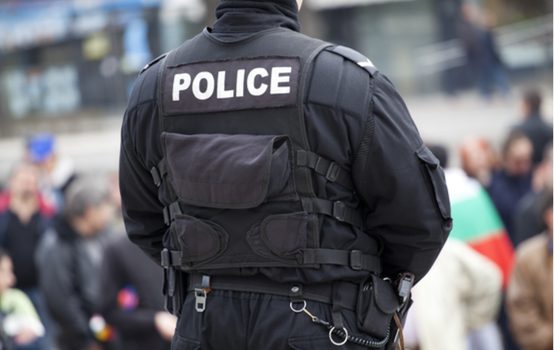Police Officers Don’t Need Hate Crime Protections

Tensions between police and African Americans are higher than they’ve been in a long time. The Black Lives Matter movement believes racist law enforcement is singling out blacks. The Blue Lives Matter movement see a war on cops being waged across the country.
Now the police officers and their supporters have announced a new plan to fight back. They’re asking Congress to pass the Protect and Serve Act, arguing that Black Lives Matter has put police officers’ lives at greater risk.
The Protect and Serve Act would impose federal penalties for anyone who attacks a police officer. One version of the legislation would even make police a protected class under hate crimes law. The bill has already passed the House.
There’s just one problem: inflicting additional punishments for crimes against the police is a terrible idea.
The Blue Lives Matter movement emerged after the 2014 ambush murders of New York City police officers Wenjian Liu and Rafael Ramos who were murdered while sitting in their patrol car.
The perpetrator, who later committed suicide, had traveled all the way from Baltimore to carry out this grisly deed. He wrote in his suicide note that the crime was meant as retaliation for the deaths of Eric Garner and Michael Brown, both of whom were killed by police officers whom grand juries then declined to indict.
Blue Lives Matter has criticized so-called anti-police rhetoric by Black Lives Matter and its supporters. Their first target was supposedly “anti-police” remarks by New York City Mayor Bill de Blasio.
Blue Lives Matter and its allies have also pushed for Protect and Serve-like laws at the state level. In 2016, Louisiana became the first state to enact such a law.
That brings us to the proposed federal version, the “Protect and Serve Act,” which has House and Senate drafts that take different approaches. The House bill enhances penalties for attacking and/or killing police officers. The Senate version expands federal hate crime protections to police.
If enacted into law, these initiatives would be prone to abuse by out-of-control police departments and prosecutors. They would federalize crimes that are best prosecuted by state and local authorities. They are blatantly unconstitutional. And the Senate version’s expansion of hate crimes law is a move in the wrong direction.
That first concern, about rogue prosecutors, is already a reality. In September 2016, a drunk man, Raul Delatoba, was arrested by two Louisiana State Troopers after he damaged a window in a French Quarter hotel and used racial slurs. When Delatoba was taken to the New Orleans Police Department’s 8th District Station, he used racial and sexist slurs against two NOPD officers and verbally attacked others.
This was enough for an NOPD sergeant to bring hate crimes charges against Delatoba—even though at the time of the arrest, the local chapter of the Anti-Defamation League did not believe his conduct amounted to a hate crime. (The NOPD later admitted that Delatoba was wrongly charged and the Orleans Parish District Attorney’s office refused to prosecute the hate crime charges.)
The Senate Protect and Serve Act’s expansion of hate crimes to protect police officers has drawn harsh criticism from civil rights organizations, including the ACLU, Human Rights Watch, and the NAACP Legal Defense and Educational Fund. They say the protections are not needed because police officers are not vulnerable to bias or discrimination as are people of color and other marginalized communities.
They’re right about that, but the better solution is to end federal hate crimes statutes entirely. Such laws force the justice system to read the minds of perpetrators. They devalue crimes committed against non-protected people. They violate the 14th Amendment’s guarantee of equal protection under the law. And they’re subject to selective enforcement and are ineffective. Even progressive lawyers acknowledge they do not work.
The Protect and Serve Act would also contribute to the problematic trend of state and local crimes being federalized. If either version of the law is enacted, it could turn every action against police officers into a federal crime.
As of 2014, there were more than 4,500 federal crimes on the books. Many of these statutes duplicate state and local laws, which would also be true of the Protect and Serve Act. Thirty-eight states already have enhanced penalties in place for violence against police officers. Why does the federal government need to slap on yet another legal layer?
Another problem is that the Protect and Serve Act is unconstitutional, full stop. Libertarian attorney Ilya Somin writes at the Volokh Conspiracy: “In United States v. Morrison (2000), the Supreme Court ruled that the Constitution does not give the federal government a general ‘police power’ authorizing it to punish violent crime throughout the nation.”
Somin also notes that Morrison struck down part of the Violence Against Women Act, which allowed victims to sue their assailants in federal court, a precedent he believes will also doom the Protect and Serve Act. The Founding Fathers did not intend for the federal government to play a role in day-to-day policing.
The Protect and Serve Act is an atrocious example of election year pandering. It is an unconstitutional power grab by the federal government in the service of police unions and their allies. Congress should think carefully before it votes through such a piece of legislation.
Kevin Boyd is a freelance writer. He has been published at The Federalist, IJ Review, the New York Observer, the Atlanta Journal-Constitution, and the National Interest. You can follow him on Twitter @TheKevinBoyd.
Comments